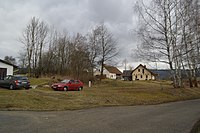Saladin
| Ṣalāḥ al-Dīn Yūsuf ibn Ayyūb | |
|---|---|
| Sultan of Egypt and Syria | |
 | |
| Statue of Saladin in Damascus. | |
| Reign | 1174–1193 |
| Coronation | 1174, Cairo |
| Full name | Ṣalāḥ ad-Dīn Yūsuf ibn Ayyūb |
| Born | c. 1137–1138 |
| Birthplace | Tikrit, Iraq[1] |
| Died | March 4, 1193 CE (aged 55–56) |
| Place of death | Damascus, Syria |
| Buried | Umayyad Mosque, Damascus, Syria |
| Predecessor | Nur ad-Din Zangi |
| Successor | Al-Afdal (Syria) Al-Aziz Uthman (Egypt) |
| Dynasty | Ayyubid |
| Father | Najm ad-Dīn Ayyūb |
| Religious beliefs | Sunni Islam |
He led the Muslims against the Crusaders and eventually recaptured Palestine from the Crusader Kingdom of Jerusalem after his victory in the Battle of Hattin. As such, he is a notable figure in Kurdish, Arab, and Muslim culture. Saladin was a strict adherent of Sunni Islam and a mystical disciple of the Qadiri Sufi order.[4] His chivalrous behavior was noted by Christian chroniclers, especially in the accounts of the siege of Kerak in Moab, and despite being the nemesis of the Crusaders he won the respect of many of them, including Richard the Lionheart; rather than becoming a hated figure in Europe, he became a celebrated example of the principles of chivalry.
Contents[show] |
Sources
There are many contemporary and near-contemporary sources available for Saladin's career. Among Saladin's admirers who produced personal biographies are the historians: Qadi al-Fadil from Ascalon; Imad al-Din al-Isfahani, and Ibn Shaddad, a jurist from Mosul. Ibn al-Athir (d. 1233), on the other hand, produced a more hostile picture.Early life
Saladin was born in Tikrit, Iraq. His family was of Kurdish background and ancestry,[2][3] and had originated from the city of Dvin, in medieval Armenia.[5][6] His father, Najm ad-Din Ayyub, was banished from Tikrit and in 1139, he and his uncle Asad al-Din Shirkuh, moved to Mosul. He later joined the service of Imad ad-Din Zengi who made him commander of his fortress in Baalbek. After the death of Zengi in 1146, his son, Nur ad-Din, became the regent of Aleppo and the leader of the Zengids.[7]Saladin, who now lived in Damascus, was reported to have a particular fondness of the city, but information on his early childhood is scarce. About education, Saladin wrote "children are brought up in the way in which their elders were brought up." According to one of his biographers, al-Wahrani, Saladin was able to answer questions on Euclid, the Almagest, arithmetic, and law, but this was an academic ideal and it was study of the Qur'an and the "sciences of religion" that linked him to his contemporaries.[7] Several sources claim that during his studies he was more interested in religion than joining the military.[8] Another factor which may have affected his interest in religion was that during the First Crusade, Jerusalem was taken in a surprise attack by the Christians.[8] In addition to Islam, Saladin had a knowledge of the genealogies, biographies, and histories of the Arabs, as well as the bloodlines of Arabian horses. More significantly, he knew the Hamasah of Abu Tammam by heart.[7]

